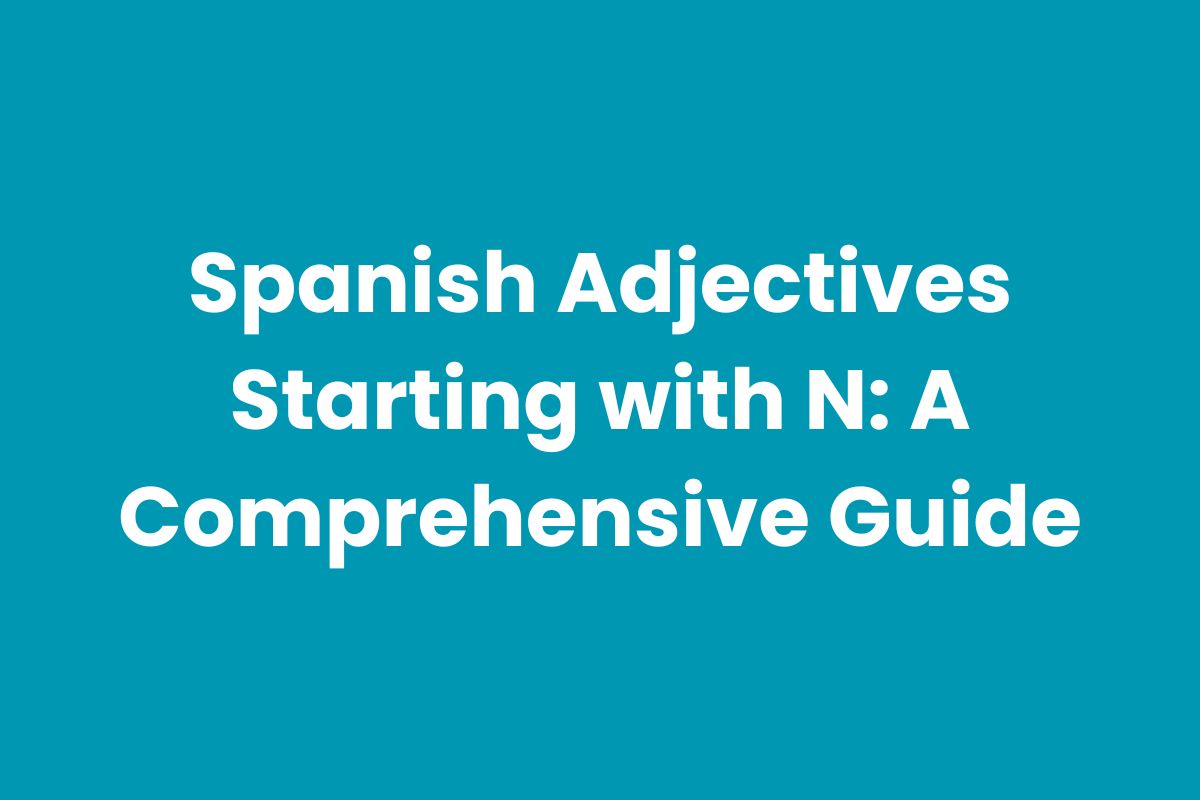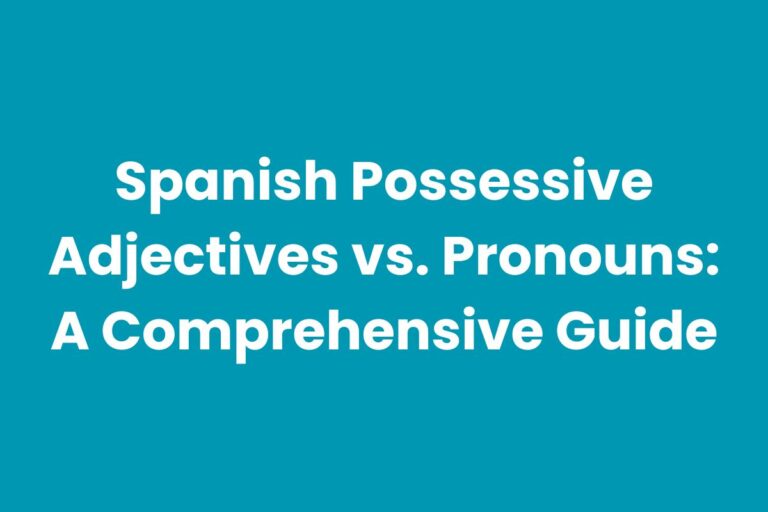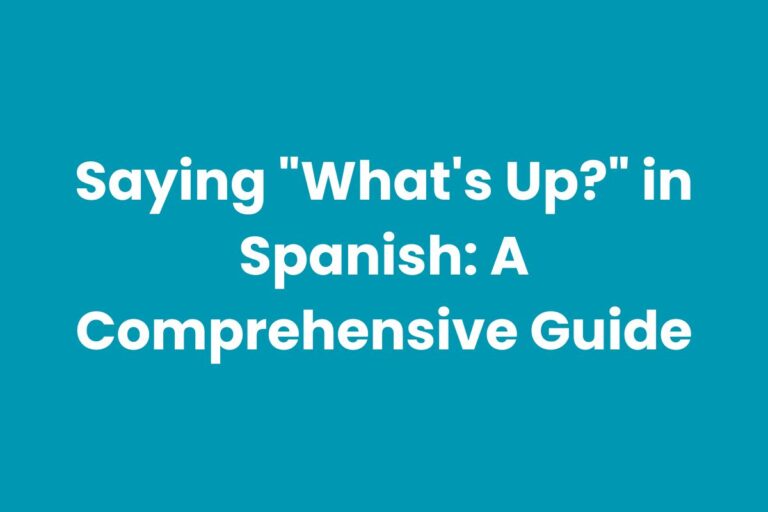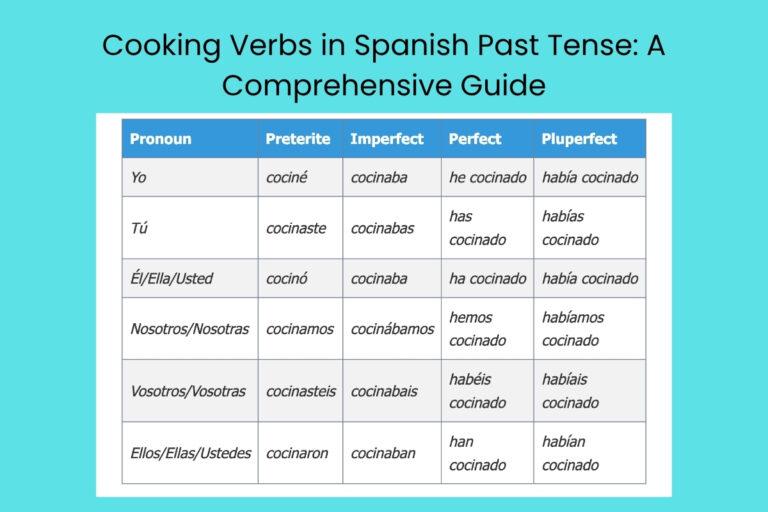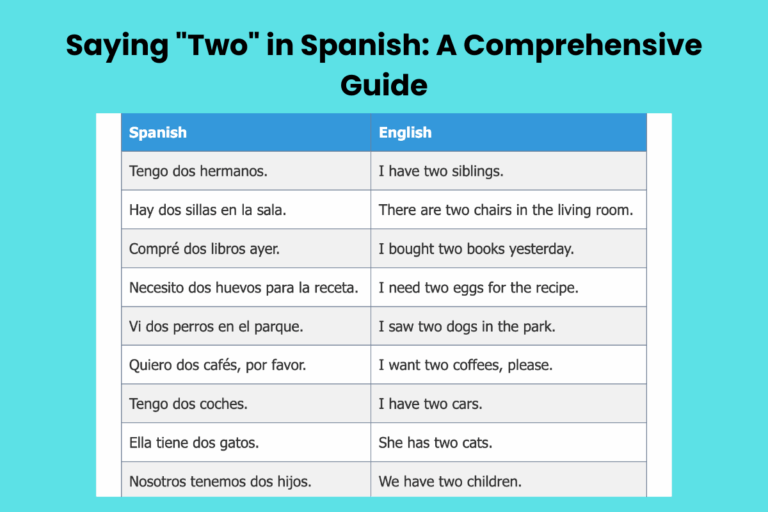Spanish Adjectives Starting with N: A Comprehensive Guide
Understanding adjectives is crucial for mastering any language, and Spanish is no exception. Adjectives add color and detail to our descriptions, making our communication more vivid and precise.
This article focuses specifically on Spanish adjectives that begin with the letter “N,” providing a comprehensive overview of their meanings, usage, and grammatical nuances. Whether you’re a beginner just starting your Spanish journey or an advanced learner aiming to refine your skills, this guide will equip you with the knowledge and practice you need to confidently use these adjectives in your everyday conversations and writing.
Mastering these adjectives will not only expand your vocabulary but also enhance your ability to express yourself with greater nuance and accuracy in Spanish. This guide is designed for students, travelers, and anyone interested in deepening their understanding of the Spanish language.
By the end of this article, you’ll have a solid foundation in using “N” adjectives effectively.
Table of Contents
- Introduction
- Definition of Spanish Adjectives
- Structural Breakdown
- Types and Categories of “N” Adjectives
- Examples of “N” Adjectives
- Usage Rules for “N” Adjectives
- Common Mistakes with “N” Adjectives
- Practice Exercises
- Advanced Topics
- Frequently Asked Questions
- Conclusion
Definition of Spanish Adjectives
In Spanish, adjectives (adjetivos) are words that describe or modify nouns (sustantivos). They provide additional information about the noun, such as its qualities, characteristics, or attributes. Adjectives in Spanish agree in gender (masculine or feminine) and number (singular or plural) with the nouns they modify. This agreement is a fundamental aspect of Spanish grammar and essential for constructing grammatically correct sentences. Adjectives can describe a wide range of attributes, including physical characteristics, personality traits, nationalities, and quantities.
The function of an adjective is to provide more specific detail about a noun, enriching the sentence and making it more descriptive. Without adjectives, sentences would be bland and lack the nuance needed to convey precise meaning.
In different contexts, adjectives can also carry emotional weight or provide subjective evaluations. Consider the difference between saying “un coche” (a car) and “un coche nuevo” (a new car).
The adjective ‘nuevo’ adds crucial information that changes the perception of the noun.
Spanish adjectives are classified based on various criteria, including their form, meaning, and function. Some adjectives are descriptive, providing qualities or characteristics of the noun (e.g., alto – tall, inteligente – intelligent). Others are possessive, indicating ownership (e.g., mi – my, tu – your). Still, others are demonstrative, pointing out specific nouns (e.g., este – this, ese – that). Understanding these classifications helps in using adjectives correctly and effectively.
Structural Breakdown
The structure of Spanish adjectives is relatively straightforward, but understanding the basic rules is crucial for correct usage. Most Spanish adjectives have different forms depending on the gender and number of the noun they modify.
Typically, adjectives ending in “-o” have four forms: masculine singular, feminine singular, masculine plural, and feminine plural. Adjectives ending in “-e” or consonants usually have only two forms: singular and plural.
The plural is typically formed by adding “-s” to adjectives ending in a vowel and “-es” to those ending in a consonant. However, there are exceptions and irregularities to these rules, which will be discussed later in this article.
The basic patterns for adjective agreement are as follows:
- Masculine Singular: The base form of the adjective (e.g., nuevo)
- Feminine Singular: Typically formed by changing “-o” to “-a” (e.g., nueva)
- Masculine Plural: Typically formed by adding “-s” to the masculine singular form (e.g., nuevos)
- Feminine Plural: Typically formed by adding “-s” to the feminine singular form (e.g., nuevas)
Consider the adjective “inteligente” (intelligent). Because it ends in “-e,” it has the same form for both masculine and feminine singular nouns.
However, the plural forms are “inteligentes” for both masculine and feminine plural nouns. This simplifies the agreement process for these types of adjectives.
Pay close attention to the ending of the adjective to determine the correct form to use. Some adjectives have irregular plural forms, which must be memorized.
The position of adjectives in Spanish sentences is also important. Generally, descriptive adjectives follow the noun they modify (e.g., el libro interesante – the interesting book). However, some adjectives, especially those expressing subjective opinions or inherent qualities, often precede the noun (e.g., una buena persona – a good person). The position of the adjective can sometimes change the meaning or emphasis of the sentence. Understanding these nuances will help you to use adjectives more effectively and naturally in Spanish.
Types and Categories of “N” Adjectives
Spanish adjectives starting with “N” can be categorized into several types based on their meaning and function. These categories include nationality adjectives, descriptive adjectives, and numerical adjectives.
Understanding these categories can help you to better grasp the nuances of each adjective and use them correctly in different contexts.
Nationality Adjectives
Nationality adjectives indicate the origin or nationality of a person, place, or thing. They are crucial for describing cultural and geographical affiliations. Many nationality adjectives in Spanish end in “-o” or “-a,” following the typical gender agreement rules. Some examples include nigeriano (Nigerian), noruego (Norwegian), and neozelandés (New Zealander). These adjectives are often used to describe people, products, or cultural aspects associated with a particular country.
When using nationality adjectives, it’s important to remember the gender and number agreement. For example, “un hombre nigeriano” (a Nigerian man) and “una mujer nigeriana” (a Nigerian woman).
The plural forms would be “hombres nigerianos” (Nigerian men) and “mujeres nigerianas” (Nigerian women). Some nationality adjectives have irregular forms or spellings, so it’s important to pay attention to these exceptions.
Descriptive Adjectives
Descriptive adjectives provide details about the qualities or characteristics of a noun. They can describe physical attributes, personality traits, or other distinguishing features. Examples of descriptive adjectives starting with “N” include natural (natural), necesario (necessary), and notable (notable). These adjectives are used to add depth and detail to descriptions, making them more vivid and informative.
Descriptive adjectives can be used in a variety of contexts to describe people, places, things, or ideas. For example, “un paisaje natural” (a natural landscape), “un esfuerzo necesario” (a necessary effort), and “un logro notable” (a notable achievement).
The placement of descriptive adjectives can sometimes affect the emphasis or meaning of the sentence. Generally, placing the adjective after the noun is more common, but placing it before the noun can add emphasis or convey a subjective opinion.
Numerical Adjectives
Numerical adjectives indicate quantity or order. While there aren’t many common numerical adjectives starting with “N” in Spanish, it’s important to understand how numbers function adjectivally.
For example, “nueve” (nine) can be used as an adjective in certain contexts, although it’s more commonly used as a noun. Numerical adjectives must also agree in number with the noun they modify, although they do not change for gender.
When using numerical adjectives, it’s important to pay attention to the context and ensure that the sentence is grammatically correct. For example, “nueve libros” (nine books) is a correct usage of “nueve” as an adjective.
In some cases, numerical adjectives may be replaced by other types of adjectives that convey a similar meaning, such as “varios” (various) or “muchos” (many).
Examples of “N” Adjectives
This section provides extensive examples of Spanish adjectives starting with “N,” organized by category. These examples illustrate how to use these adjectives correctly in different contexts and highlight their grammatical properties.
Nationality Adjectives Examples
The following table provides examples of nationality adjectives that start with “N” in Spanish. Each example includes the adjective in both masculine and feminine forms, as well as example sentences to illustrate their usage.
| Adjective (Masculine) | Adjective (Feminine) | English Translation | Example Sentence | English Translation |
|---|---|---|---|---|
| Nigeriano | Nigeriana | Nigerian | Él es un escritor nigeriano famoso. | He is a famous Nigerian writer. |
| Noruego | Noruega | Norwegian | Ella es una esquiadora noruega talentosa. | She is a talented Norwegian skier. |
| Neozelandés | Neozelandesa | New Zealander | Es un jugador de rugby neozelandés. | He is a New Zealander rugby player. |
| Namibio | Namibia | Namibian | Esta es una artesana namibia. | This is a Namibian artisan. |
| Nepalés | Nepalesa | Nepalese | El guía es un sherpa nepalés. | The guide is a Nepalese sherpa. |
| Nicaragüense | Nicaragüense | Nicaraguan | Es un poeta nicaragüense prominente. | He is a prominent Nicaraguan poet. |
| Norcoreano | Norcoreana | North Korean | La película fue hecha por un director norcoreano. | The film was made by a North Korean director. |
| Norteamericano | Norteamericana | North American | Ella es una turista norteamericana. | She is a North American tourist. |
| Natal | Natal | Natal | Es una ciudad natal para muchos. | It is a native city for many. |
| Nacional | Nacional | National | Es un heroe nacional. | He is a national hero. |
| Nativo | Nativa | Native | Soy nativo de aqui. | I am native to here. |
| Navajo | Navaja | Navajo | La tribu es navajo. | The tribe is navajo. |
| Nauruano | Naurana | Nauruan | El hombre es Nauruano. | The man is Nauruan. |
| Neerlandés | Neerlandesa | Dutch | La mujer es neerlandesa. | The woman is dutch. |
| Nigérien | Nigérienne | Nigerien | La persona es nigerien. | The person is nigerien. |
| Norirlandés | Norirlandesa | Northern Irish | El grupo es norirlandés. | The group is Northern Irish. |
| Napolitano | Napolitana | Neapolitan | La pizza es napolitana. | The pizza is neapolitan. |
| Norfolkiano | Norfolkiana | Norfolk Islander | El hombre es Norfolkiano. | The man is Norfolk Islander. |
| Norsamarino | Norsamarina | North Samarian | La mujer es Norsamarina. | The woman is North Samarian. |
| Nauruirlandés | Nauruirlandesa | Nauruirish | El chico es Nauruirlandés. | The boy is Nauruirish. |
| Nafarroa | Nafarroa | Navarre | La ciudad es Nafarroa. | The city is Navarre. |
| Nacionalista | Nacionalista | Nationalist | El hombre es nacionalista. | The man is nationalist. |
| Nambiano | Nambiana | Nambian | La mujer es Nambiana. | The woman is Nambian. |
| Nacionalista | Nacionalista | Nationalist | El hombre es nacionalista. | The man is nationalist. |
| Navarrese | Navarrese | Navarrese | La comida es Navarrese. | The food is Navarrese. |
| Nacionalmente | Nacionalmente | Nationally | El es nacionalmente famoso. | He is nationally famous. |
| Naturalizado | Naturalizada | Naturalized | El es naturalizado. | He is naturalized. |
| Namibiano | Namibiana | Namibian | El producto es Namibiano. | The product is Namibian. |
As you can see from these examples, nationality adjectives provide important information about the origin or affiliation of a person or thing. Pay attention to the gender and number agreement to use these adjectives correctly.
Descriptive Adjectives Examples
The following table provides examples of descriptive adjectives starting with “N” in Spanish. Each example includes the adjective and example sentences to illustrate their usage.
| Adjective | English Translation | Example Sentence | English Translation |
|---|---|---|---|
| Natural | Natural | Es un paisaje natural impresionante. | It’s an impressive natural landscape. |
| Necesario | Necessary | Es necesario estudiar para el examen. | It’s necessary to study for the exam. |
| Notable | Notable | Su progreso es notable. | His progress is notable. |
| Negro | Black | El gato es negro. | The cat is black. |
| Nuevo | New | Tengo un coche nuevo. | I have a new car. |
| Noble | Noble | Es un noble gesto. | It’s a noble gesture. |
| Normal | Normal | Es un día normal. | It’s a normal day. |
| Nítido | Clear | La imagen es nítida. | The picture is clear. |
| Nutritivo | Nutritious | La comida es nutritiva. | The food is nutritious. |
| Neurálgico | Neuralgic | El punto es neurálgico. | The point is neuralgic. |
| Nocturno | Nocturnal | El animal es nocturno. | The animal is nocturnal. |
| Nominal | Nominal | El valor es nominal. | The value is nominal. |
| Negligente | Negligent | Es negligente. | He is negligent. |
| Notablemente | Notably | Es notablemente alto. | He is notably tall. |
| Negociable | Negotiable | El precio es negociable. | The price is negotiable. |
| Nervioso | Nervous | Estoy nervioso. | I’m nervous. |
| Necesitada | Needy | Ella es necesitada. | She is needy. |
| Neutro | Neutral | Es un punto neutro. | It’s a neutral point. |
| Nocivo | Harmful | Es nocivo. | It’s harmful. |
| Notable | Notable | El avance es notable. | The advance is notable. |
| Negativo | Negative | El resultado es negativo. | The result is negative. |
| Nacional | National | Es un problema nacional. | It’s a national problem. |
| Nupcial | Nuptial | El evento es nupcial. | The event is nuptial. |
| Nublado | Cloudy | El cielo esta nublado. | The sky is cloudy. |
| Notable | Noteworthy | Es un evento notable. | It’s a noteworthy event. |
| Nombrado | Named | El es nombrado. | He is named. |
| Narrativo | Narrative | Es un estilo narrativo. | It’s a narrative style. |
| Natatorio | Natatorial | Es un evento natatorio. | It’s a natatorial event. |
| Nauseabundo | Nauseating | El olor es nauseabundo. | The smell is nauseating. |
These examples demonstrate the variety of descriptive adjectives that start with “N” in Spanish. Use these adjectives to add detail and color to your descriptions.
Numerical Adjectives Examples
While numerical adjectives starting with “N” are less common, here are some examples of how numbers can function adjectivally.
| Adjective | English Translation | Example Sentence | English Translation |
|---|---|---|---|
| Nueve | Nine | Tengo nueve libros. | I have nine books. |
| Novenos | Ninth | Son los novenos participantes. | They are the ninth participants. |
| Ninguno | None | No tengo ningun amigo. | I have no friends. |
| Números | Numbers | Estos son numeros primos. | These are prime numbers. |
| Numerales | Numeral | Son adjetivos numerales. | They are numeral adjectives. |
| N-ésimo | N-th | Es el n-ésimo intento. | It’s the n-th attempt. |
| N veces | N times | Lo he intentado n veces. | I have tried it n times. |
| Numerosos | Numerous | Hay numerosos problemas. | There are numerous problems. |
| Ninguna | No | No hay ninguna razon. | There is no reason. |
| Noventa | Ninety | Tengo noventa años. | I am ninety years old. |
| Nonagésimo | Ninetieth | Es el nonagésimo aniversario. | It is the ninetieth anniversary. |
| Novecientos | Nine hundred | Hay novecientos estudiantes. | There are nine hundred students. |
| Nuevamente | Again | Lo intentaré nuevamente. | I will try again. |
| Nunca | Never | Nunca lo he visto. | I have never seen it. |
| Nadie | Nobody | No hay nadie aquí. | There is nobody here. |
| Nada | Nothing | No tengo nada. | I have nothing. |
| Ni | Nor | No tengo ni tiempo ni dinero. | I have neither time nor money. |
| Ni siquiera | Not even | Ni siquiera lo intenté. | I didn’t even try it. |
| Nacido | Born | He nacido aquí. | I was born here. |
| Notorio | Notorious | Es un criminal notorio. | He is a notorious criminal. |
| Notable | Notable | Es un evento notable. | It’s a notable event. |
| Novedoso | Novel | Es un enfoque novedoso. | It’s a novel approach. |
| Nítidamente | Clearly | Se ve nítidamente. | It is clearly seen. |
| Necesariamente | Necessarily | Es necesariamente cierto. | It is necessarily true. |
| Niñez | Childhood | Recuerdo mi niñez. | I remember my childhood. |
| Novato | Novice | Soy un novato. | I am a novice. |
| Nutricional | Nutritional | Es información nutricional. | It’s nutritional information. |
| Numerable | Numerable | Es un conjunto numerable. | It’s a numerable set. |
| Numerable | Numerable | Es un conjunto numerable. | It’s a numerable set. |
These examples demonstrate the usage of numerical adjectives in Spanish, even though they are less common than descriptive or nationality adjectives.
Usage Rules for “N” Adjectives
Using Spanish adjectives correctly involves understanding several key rules, including gender and number agreement, adjective position, and exceptions to the general rules.
Gender and Number Agreement
The most fundamental rule for using Spanish adjectives is that they must agree in gender and number with the nouns they modify. This means that if the noun is masculine singular, the adjective must also be masculine singular.
If the noun is feminine plural, the adjective must also be feminine plural. Failure to adhere to this rule will result in grammatically incorrect sentences.
For example:
- El libro nuevo (The new book) – Masculine singular
- La casa nueva (The new house) – Feminine singular
- Los libros nuevos (The new books) – Masculine plural
- Las casas nuevas (The new houses) – Feminine plural
Adjectives that end in “-o” typically have four forms to accommodate gender and number agreement. Adjectives that end in “-e” or a consonant typically have only two forms: singular and plural.
Remember to adjust the adjective form to match the noun it modifies.
Adjective Position
In Spanish, the position of the adjective relative to the noun can affect the meaning or emphasis of the sentence. Generally, descriptive adjectives follow the noun (e.g., el coche rojo – the red car). However, some adjectives, particularly those expressing subjective opinions or inherent qualities, often precede the noun (e.g., una buena persona – a good person).
Consider these examples:
- Un hombre pobre (A poor man – lacking money)
- Un pobre hombre (A poor man – pitiable)
The position of “pobre” changes the meaning of the sentence. When it follows the noun, it describes the man’s financial status.
When it precedes the noun, it expresses sympathy or pity for the man. Pay attention to the context and the desired emphasis when deciding where to place the adjective.
Exceptions and Special Cases
There are several exceptions and special cases to the general rules for using Spanish adjectives. Some adjectives have irregular plural forms, while others have different meanings depending on their position relative to the noun.
It’s important to be aware of these exceptions to avoid making mistakes.
Some common exceptions include:
- Adjectives ending in “-z” change the “z” to “c” before adding “-es” to form the plural (e.g., feliz – felices).
- Some adjectives have different meanings depending on their position (e.g., grande – big, un gran hombre – a great man).
Be sure to consult a dictionary or grammar guide when in doubt about the correct form or usage of an adjective. Practice and exposure to the language will also help you to become more familiar with these exceptions.
Common Mistakes with “N” Adjectives
One of the most common mistakes when using Spanish adjectives is failing to ensure gender and number agreement with the noun. This can lead to sentences that sound awkward or grammatically incorrect.
For example:
- Incorrect: El libro nueva
- Correct: El libro nuevo
Another common mistake is using the wrong adjective position. Placing an adjective before or after the noun can change the meaning of the sentence, so it’s important to be aware of the nuances of adjective placement.
For example:
- Incorrect: Un grande problema
- Correct: Un gran problema
Finally, it’s important to be aware of exceptions to the general rules for adjective formation and usage. Some adjectives have irregular plural forms or different meanings depending on their position.
For example:
- Incorrect: Felizes
- Correct: Felices
By being aware of these common mistakes and practicing your adjective usage, you can avoid making errors and improve your fluency in Spanish.
Practice Exercises
These practice exercises will help you reinforce your understanding of Spanish adjectives that start with “N.” Each exercise focuses on different aspects of adjective usage, including gender and number agreement, adjective position, and vocabulary.
Exercise 1: Fill in the Blanks
Fill in the blanks with the correct form of the adjective provided in parentheses.
| Sentence | Adjective (Base Form) | Correct Form |
|---|---|---|
| Ella es una estudiante ________ (nigeriano). | nigeriano | nigeriana |
| Es un libro ________ (necesario). | necesario | necesario |
| Los coches ________ (nuevo) son caros. | nuevo | nuevos |
| Es una casa ________ (natural). | natural | natural |
| Es un hombre ________ (noble). | noble | noble |
| Las flores ________ (negro) son raras. | negro | negras |
| Es un día ________ (normal). | normal | normal |
| Es una imagen ________ (nítido). | nítido | nítida |
| Es una comida ________ (nutritivo). | nutritivo | nutritiva |
| Es un punto ________ (neurálgico). | neurálgico | neurálgico |
Exercise 2: Translate the Sentences
Translate the following sentences into Spanish, using adjectives that start with “N.”
| English Sentence | Spanish Translation |
|---|---|
| He is a Nigerian doctor. | Él es un médico nigeriano. |
| It is a necessary condition. | Es una condición necesaria. |
| The new cars are fast. | Los coches nuevos son rápidos. |
| It is a natural phenomenon. | Es un fenómeno natural. |
| She is a noble woman. | Ella es una mujer noble. |
| The black cats are cute. | Los gatos negros son lindos. |
| It is a normal situation. | Es una situación normal. |
| The image is clear. | La imagen es nítida. |
| The food is nutritious. | La comida es nutritiva. |
| It is a neuralgic point. | Es un punto neurálgico. |
Exercise 3: Correct the Errors
Identify and correct the errors in the following sentences.
| Incorrect Sentence | Corrected Sentence |
|---|---|
| El casa nuevo es grande. | La casa nueva es grande. |
| Las libros nuevo son interesantes. | Los libros nuevos son interesantes. |
| Es un hombre nigeriana. | Es un hombre nigeriano. |
| La coche negro es rápido. | El coche negro es rápido. |
| Es una
condición necesario. |
Es una condición necesaria. |
| El mujer noble es amable. | La mujer noble es amable. |
| Los arboles natural son altos. | Los árboles naturales son altos. |
| Es un día normales. | Es un día normal. |
| La imagen nítidos es clara. | La imagen nítida es clara. |
| Es una comida nutritivos. | Es una comida nutritiva. |
Advanced Topics
For advanced learners, understanding the subtle nuances and idiomatic expressions involving “N” adjectives can further refine their language skills.
Subtle Nuances in Meaning
Some Spanish adjectives starting with “N” have subtle nuances in meaning that can only be understood through extensive exposure and practice. For example, the adjective “natural” can have different connotations depending on the context.
It can refer to something that is inherent or innate, or it can refer to something that is not artificial or man-made. Understanding these nuances is crucial for using these adjectives correctly and effectively.
Consider these examples:
- Es un talento natural (It’s a natural talent) – Inherent ability
- Es un producto natural (It’s a natural product) – Not artificial
The subtle differences in meaning can only be grasped through careful consideration of the context and the intended message.
Idiomatic Expressions
Spanish, like any language, has many idiomatic expressions that involve adjectives. These expressions often have meanings that cannot be understood simply by knowing the individual words.
Learning these expressions can greatly enhance your fluency and understanding of the language.
Some examples of idiomatic expressions involving adjectives starting with “N” include:
- Estar en las nubes (To be in the clouds) – To be distracted or daydreaming
- Nacer con una cuchara de plata en la boca (To be born with a silver spoon in one’s mouth) – To be born into wealth and privilege
These expressions add color and flavor to the language and are an important part of mastering Spanish.
Frequently Asked Questions
Conclusion
Mastering Spanish adjectives, especially those starting with the letter “N,” is essential for enhancing your language proficiency and expressing yourself with greater accuracy and nuance. This guide has provided a comprehensive overview of “N” adjectives, including their definitions, structural breakdown, types, usage rules, common mistakes, and practice exercises.
By understanding these concepts and practicing regularly, you can confidently use “N” adjectives in your everyday conversations and writing.
Remember to pay attention to gender and number agreement, adjective position, and exceptions to the general rules. Practice using these adjectives in different contexts and don’t be afraid to make mistakes and learn from them.
With dedication and effort, you can master Spanish adjectives and take your language skills to the next level. ¡Buena suerte!

